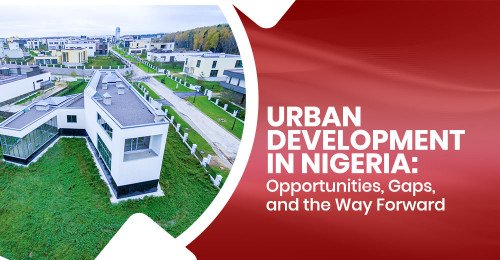
Urban Development in Nigeria: Opportunities, Gaps, and the Way Forward
Nigeria, Africa’s most populous nation, is witnessing rapid urbanization. Cities like Lagos, Abuja, Port Harcourt, and Kano are expanding at unprecedented rates, driven by population growth, rural-urban migration, and economic ambition. Yet, with this growth comes both promise and challenge.
At the School of Estate and Business, we believe urban development isn’t just about building cities — it’s about shaping sustainable, inclusive, and prosperous communities. Let’s explore the opportunities, gaps, and the way forward for urban development in Nigeria.
Opportunities in Urban Development
1. Growing Demand for Housing and Infrastructure
With over half of Nigeria’s population expected to live in urban areas by 2050, the demand for affordable housing, quality roads, water supply, and electricity is massive. This presents huge prospects for real estate investors, developers, and construction professionals.
2. Technology and Smart Cities
Nigeria’s urban future can harness technology — smart grids, digital payments, surveillance systems, and data-driven urban planning — to improve city living. Startups and tech companies are increasingly entering the urban development space, offering innovative solutions.
3. Public-Private Partnerships (PPP)
There’s growing recognition that government alone can’t meet the scale of urban infrastructure needs. PPPs offer a model where private sector efficiency meets public sector purpose, creating win-win solutions in housing, transportation, and utilities.
4. Job Creation and Economic Hubs
Urban centers are engines of economic growth. From markets to manufacturing clusters and service hubs, well-planned cities drive entrepreneurship and job creation, reducing poverty and inequality.
Gaps and Challenges
1. Housing Deficit
Nigeria faces a housing shortfall estimated at over 17 million units. Many city dwellers live in slums or informal settlements, with limited access to basic services.
2. Poor Urban Planning
Rapid and uncoordinated urban expansion leads to congestion, flooding, and poor waste management. Many cities lack updated master plans, and land use regulations are weakly enforced.
3. Infrastructure Decay and Deficit
From bad roads to unreliable power supply, infrastructure gaps limit economic productivity and quality of life.
4. Environmental Degradation
Unregulated development contributes to deforestation, pollution, and loss of green spaces, making cities less resilient to climate change.
5. Inadequate Financing
Urban development is capital-intensive. Many local governments lack the financial capacity to fund large-scale projects, while private investors often face policy uncertainty.
The Way Forward
Strengthen Urban Planning Frameworks
Nigeria must prioritize modern, data-driven urban planning that reflects population growth, climate resilience, and inclusiveness. Master plans should be living documents, regularly reviewed and enforced.
Promote Affordable Housing Initiatives
Policies that support affordable housing — through mortgage financing, housing cooperatives, and low-cost building technologies — are key. Partnerships between government and private developers can scale these efforts.
Embrace Sustainable Development Principles
Green building, renewable energy, efficient waste management, and preservation of natural ecosystems should be integrated into urban development strategies.
Leverage Technology
Smart city solutions, Geographic Information Systems (GIS), and digital platforms can enhance urban service delivery and citizen engagement.
Mobilize Innovative Financing
Beyond government budgets, Nigeria must explore municipal bonds, PPPs, diaspora investments, and international development financing to fund urban growth.
Capacity Building
Urban development professionals — planners, estate surveyors, engineers, architects — must continually update their skills to match modern demands. Institutions like the School of Estate and Business play a crucial role in equipping the next generation of experts.
Final Thoughts
Urban development is more than building structures — it’s about creating cities that work for people. Nigeria has the opportunity to get it right by addressing the gaps and boldly pursuing sustainable, inclusive solutions.
At the School of Estate and Business, we are committed to nurturing professionals who will drive this transformation.
Are you passionate about shaping the cities of tomorrow? Join our programs and be part of the solution.
